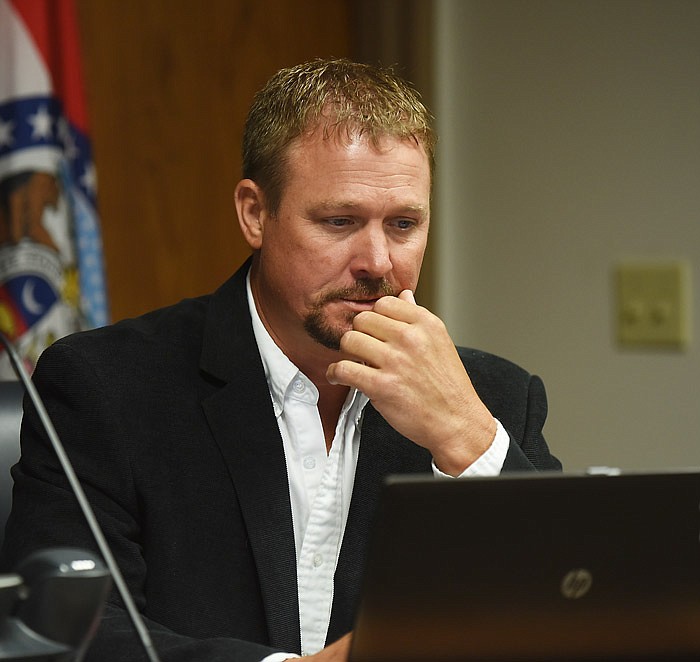The decision to fix an unnoticed change in state law, which means higher salaries for Cole County elected officials, may lead to more people seeking those offices in the future.
That's the feeling of Eastern District Commissioner Jeff Hoelscher, who voted in August against giving county officials back pay triggered by the change in state law. Presiding Commissioner Sam Bushman and Western District Commissioner Kris Scheperle voted to change the pay for 10 elected officials whose salaries were lower than they should have been.
"I think it's a slap in the face when people say you can't get quality people to run for an office because of the pay," Hoeslcher said. "It pays enough, but I am taking a pay cut because I would be making more doing more jobs with my construction business.
"I love the (commissioner's) job even with all the messes that we get into."
Although Hoelscher voted against the action, calculations completed by County Finance Officer Debbie Malzner and County Auditor Kristen Berhorst showed Hoelscher would get the most back pay of any county elected official - $99,125.93.
"There's more than one way to calculate what was going to be paid out, whether it be with a plain raise in pay or using a cost of living adjustment (COLA) or not using a COLA," Hoelscher said. "I knew it would be substantial. I'm not going to give it back, and I don't know what I'll do with the extra money.
"I do know I was going to vote no on the proposal (Aug. 23) no matter what."
The vote came after two different lawyers delivered the same message to county officials earlier this year, basing their legal opinions on a 2007 state law change and a 2011 ruling by the Springfield-based Southern District appeals court.
Lowell Pearson with the Husch Blackwell law firm told the elected officials in July it was estimated the county owed about $370,000 in back pay, plus the costs of benefits, like retirement, that were tied to the salaries.
Malzner reported Aug. 23 - after the commission's meeting and vote - the newly calculated "pay out" plus "benefit cost" would total $483,182.54 for the five-years-owed back pay.
The salary changes alone will cost $83,019.12 more per year, plus benefits.
State law since the 1980s has required all county governments to have a salary commission to deal with issues around elected officials' salaries - including the assessor, auditor, county clerk, collector, presiding and associate commissioners, public administrator, recorder of deeds and treasurer.
The circuit clerk, prosecuting attorney and sheriff are paid under different laws and are not affected by the legal opinions requested by Collector Larry Vincent in his role as salary commission chairman.
Cole County became a first-class county in 1997. State law sets four classes of counties, based on total assessed property values.
The law also sets different salary levels for the elected officials in each class - except for first-class counties with charter governments, like St. Louis and Jackson counties.
Both Pearson and Jefferson City attorney Michael Berry noted the Legislature set a salary schedule in 2005 for first-class counties but included an exception where the current pay was "lower than the compensation provided under the salary schedule" - and Cole County salaries were acceptable under that law.
But the problem came in 2007, both attorneys said, when lawmakers kept the salary schedule but removed the exception.
Taney County Collector Sheila Wyatt sued her county for paying her too little, and the county counter-sued she had been paid too much.
An appeals court opinion in July 2011 focused on the 2007 law change and said "the Legislature intended for each county official to have his or her salary set at the statutory amount."
In Cole County, both Berry and Pearson advised the officials that means the affected county officials should be making $57,000 a year - no matter whether their jobs are considered full time or part time.
The two associate commissioners would earn $55,000 a year under a separate law that gives the presiding commissioner $2,000 more each year than the associates.
In 2011, none of the elected officials earned $57,000 a year, and only Public Administrator Marilyn Schmutzler's $56,005 came close.
With cost-of-living raises since, Schmutzler and Assessor Chris Estes will earn almost $59,439 this year, before the new salary adjustments - more than the statutory level.
Four other officials - Vincent, Auditor Kristen Berhorst, County Clerk Steve Korsmeyer and Recorder Ralph Bray - earn more than $56,000 but less than the statutory levels set in 2007.
Berry and Pearson said a five-year statute of limitations would mean the county wouldn't owe back pay for wrong salaries before 2011.
Although the commissioners' positions in Cole County generally have been viewed as part-time positions, Malzner and County Attorney Jill Lahue said there is no law addressing any county elected officials position as being full time or part time.
"With an elected official's position, it's looked at as, 'How long does it take you to do your job?'" LaHue said.
Besides their salaries, elected officials' benefits include:
Health insurance, which is paid by the county.
Dental insurance, which is paid by the county.
Life insurance for $15,000, which is paid by the county.
CERF Retirement, which is paid by the county.
LAGERS Retirement, which is paid by the county.
"No one can really read the law and give us a for-sure answer, and I would have rather made a court give us a ruling on this issue," Hoelscher said. "I'd rather have a court ruling than going on the opinions of lawyers, and that's why I voted against this.
"I think since the belief is the Legislature is telling us to do this, I see it as an unfunded mandate."


